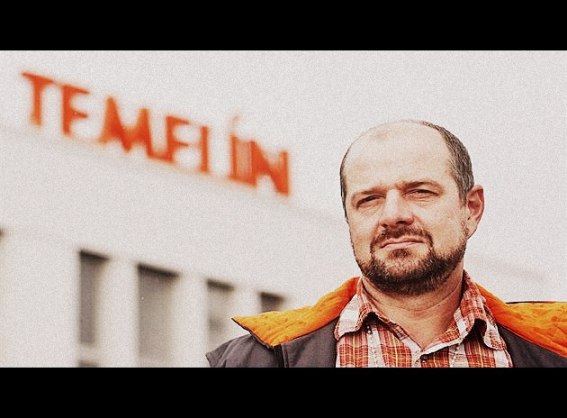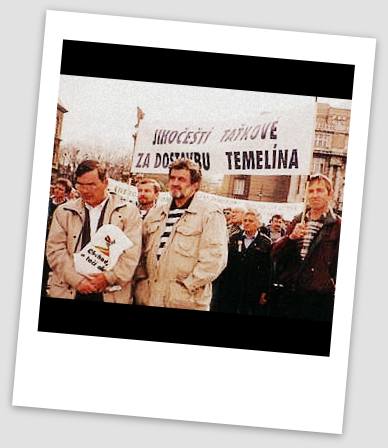ANO energy
ANO 2011's other candidate for environment minister is a nuclear engineer at Temelin - and a father.

Let the children pay
Andrej Babis has two candidates for environment minister, Richard Brabec of Lovochemie and Jiri Tyc (pictured above). Tyc is a nuclear engineer employed at Temelin NPP and a founding member of a civic association called Jihocesti tatkove or South Bohemian Dads.
Jihocesti tatkove (see here) is a typical example of what public relations people call 'grass roots' campaigning – an industry-funded lobbying effort dressed up to look like ordinary people spontaneously coming together to promote a local cause.
In the case of the fathers from southern Bohemia, the local cause is the expansion of the nuclear power plant at Temelin, which the fathers argue is the only practical way to meet the country’s future energy needs in an environmentally sound way. As good dads, they are fighting for what they think is best for their kids -and presumably for what is best for those, like Tyc, who work in the Czech nuclear industry.

When it comes to building Temelin 3&4, ANO’s candidate for environment minister says “Yes, but only if it makes economic sense”. In an ANO election video, Tyc explains that what he actually means by ‘make sense’ is ‘make more sense than any other solution’.
All power generation requires public subsidies, he points out, but only nuclear power generation is both practical and clean. So when it comes to building Temelin 3&4, his real answer is not "Yes, but...": it is ‘Yes, because nuclear generation makes more sense than any other form of energy generation today, including coal, gas, water, wind and sun.”
And this is where Jiri Tyc is quite wrong. While different national subsidy schemes for renewable energy have varied in the success with which they stimulate innovation and control costs, overall, the cost of producing renewable energy has dropped dramatically in recent years. In contrast, the cost of producing nuclear energy continues to rise.
Or to put it in terms that a hard-nosed businessman like Tyc's party leader understands, whereas the need for public subsidies to persuade investors to put their money into renewables will disappear in the next decade or so, the need for subsidies to attract commercial investors into the nuclear industry will not.
A recent study by the Boston Consulting Group (see here) supports the expectation that the cost of producing solar and nuclear energy will continue to move in opposite directions. By 2020, BCG forecasts that some renewable energy sources may actually be cost competitive with conventional sources, thus removing the need for subsidies altogether. At the same time, BCG predicts that the price of producing nuclear energy will increase. If the wholsesale price of electricity remains stagnant, the nuclear industry will remain buoyant only with massive public subsidies funded by future generations.
I can understand why Jiri Tyc, as a middle-aged nuclear engineer employed at Temelin NPP today, would want the Czech nuclear industry to grow in the future, even if the public subsidy required to fund Temelin 3&4 would total some €33 billion in today's money, spread over 35 years (see here). But I cannot understand why he would wish such an inheritance upon his children.

Let the children pay
Andrej Babis has two candidates for environment minister, Richard Brabec of Lovochemie and Jiri Tyc (pictured above). Tyc is a nuclear engineer employed at Temelin NPP and a founding member of a civic association called Jihocesti tatkove or South Bohemian Dads.
Jihocesti tatkove (see here) is a typical example of what public relations people call 'grass roots' campaigning – an industry-funded lobbying effort dressed up to look like ordinary people spontaneously coming together to promote a local cause.
In the case of the fathers from southern Bohemia, the local cause is the expansion of the nuclear power plant at Temelin, which the fathers argue is the only practical way to meet the country’s future energy needs in an environmentally sound way. As good dads, they are fighting for what they think is best for their kids -and presumably for what is best for those, like Tyc, who work in the Czech nuclear industry.

When it comes to building Temelin 3&4, ANO’s candidate for environment minister says “Yes, but only if it makes economic sense”. In an ANO election video, Tyc explains that what he actually means by ‘make sense’ is ‘make more sense than any other solution’.
All power generation requires public subsidies, he points out, but only nuclear power generation is both practical and clean. So when it comes to building Temelin 3&4, his real answer is not "Yes, but...": it is ‘Yes, because nuclear generation makes more sense than any other form of energy generation today, including coal, gas, water, wind and sun.”
And this is where Jiri Tyc is quite wrong. While different national subsidy schemes for renewable energy have varied in the success with which they stimulate innovation and control costs, overall, the cost of producing renewable energy has dropped dramatically in recent years. In contrast, the cost of producing nuclear energy continues to rise.
Or to put it in terms that a hard-nosed businessman like Tyc's party leader understands, whereas the need for public subsidies to persuade investors to put their money into renewables will disappear in the next decade or so, the need for subsidies to attract commercial investors into the nuclear industry will not.
A recent study by the Boston Consulting Group (see here) supports the expectation that the cost of producing solar and nuclear energy will continue to move in opposite directions. By 2020, BCG forecasts that some renewable energy sources may actually be cost competitive with conventional sources, thus removing the need for subsidies altogether. At the same time, BCG predicts that the price of producing nuclear energy will increase. If the wholsesale price of electricity remains stagnant, the nuclear industry will remain buoyant only with massive public subsidies funded by future generations.
I can understand why Jiri Tyc, as a middle-aged nuclear engineer employed at Temelin NPP today, would want the Czech nuclear industry to grow in the future, even if the public subsidy required to fund Temelin 3&4 would total some €33 billion in today's money, spread over 35 years (see here). But I cannot understand why he would wish such an inheritance upon his children.

 Miluji cla! Donald Trump a jeho životní láska
Miluji cla! Donald Trump a jeho životní láska Finský prezident má recept na Trumpa. Golfovou diplomacii!
Finský prezident má recept na Trumpa. Golfovou diplomacii! Ukrajinská svatba online: rychlý válečný obřad bez příkras i bez příloh
Ukrajinská svatba online: rychlý válečný obřad bez příkras i bez příloh Z deníku dobrovolníka: Nebezpečná cesta za velitelkou Runou
Z deníku dobrovolníka: Nebezpečná cesta za velitelkou Runou Týden v Česku: Bendova pravda, Babišovo kafe a Pavlovo pózování
Týden v Česku: Bendova pravda, Babišovo kafe a Pavlovo pózování

